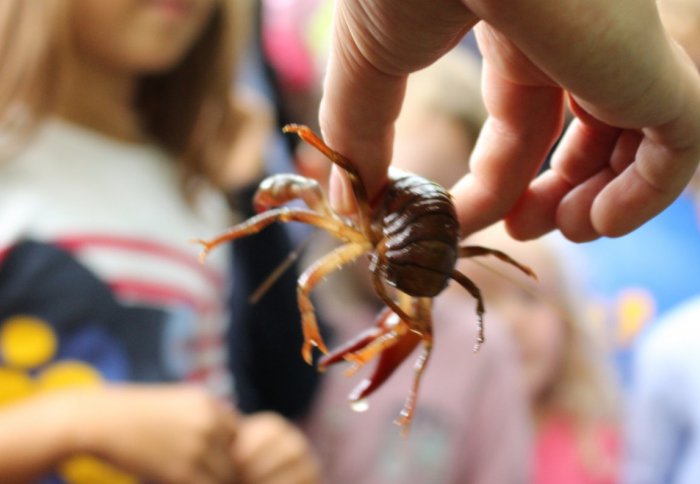Up close and personal with nature at Imperial's Silwood Park campus

On a sunny September Saturday, scientists at the Silwood Park campus invited the public to connect with the nature on their doorstep.
Whether it was hunting for bugs in the woods, fishing for crayfish in the Silwood pond, holding crested geckos and marvelling at their beautiful long eyelashes, or identifying species caught in camera traps in the Kenyan countryside, there were lots of activities on offer, to entertain visitors of all ages.
The researchers who organised the day were keen to encourage people’s interest in science and conservation.
I’m absolutely thrilled that so many people have come to visit Silwood Park to not have a fabulous family day out but also find out more about how to monitor and protect our wildlife
– Professor E.J Milner-Guland
Director of Grand Challenges in Ecosystems and Environment Initiative
Professor E.J Milner-Gulland, Director of the Grand Challenges in Ecosystems and the Environment initiative at Imperial, which co-hosted the event, said: “Scientists are not the only people who can help to conserve species. The public can also play a pivotal role in helping our natural world to thrive. I’m absolutely thrilled that so many people have come to visit Silwood Park to not have a fabulous family day out but also find out more about how to monitor and protect our wildlife.”
Dr David Slawson, Director of OPAL who co-hosted the event said: “It was fantastic to meet so many people at the event and show them how fun activities such as bug hunting and pond dipping in their own garden or local park can contribute to valuable scientific research – whatever their level of experience. We ran identification tests for children on the day and it was amazing to see the accuracy of their results. Data collected for us by the public in this way is helping our scientists learn more about the state of the UK’s environment and to study the ecology of thousands of sites we would not normally be able to access.”
You can find out what the visitors got up to listening to interviews with Imperial’s conservation scientists.
Fishing for crayfish in Imperial’s Silwood Park pond
“How big are the crayfish?” asked an excited 7 year old boy – “Big enough to give you a nasty nip on the finger,” replied PhD student Sam Lloyd, leading the fishing trip to Silwood Park’s pond. But that didn’t put off captivated kids from picking up the live crayfish and bravely investigating their claws. Fishing out two lobster nets from the pond, Sam explained to the audience that the crayfish he had captured, a species called Pacifastacus leniusculus were an invasive species that had outcompeted native crayfish originally found in the pond. In this audio interview Sam explains what makes a species invasive and tells us how Silwood’s crayfish have come to dominate the pond.
Monitoring species from your laptop or smartphone
In another exhibit the public got the chance to monitor species as far away as Mongolia, Indonesia and Kenya without leaving the grounds of Silwood Park. Instant Wild, a conservation project run by the Zoological Society of London (ZSL), saw children and adults helping scientists to identify rare species pictured in camera traps in the rainforests and Great Plains of our planet earth. In this interview Juliet Wright, who is currently studying towards a PhD at Imperial College London and ZSL, explains why it is so important to get people involved in citizen science, and how Instant Wild can help people to connect with the natural world.
Conserving the countryside in Western South Africa
Showcasing a documentary film about conservation in South Africa, Dr Andrew Knight, a senior lecturer in Conservation Practice at Imperial, said to visitors: “Conservation is not just about animals, it’s about people too”. In this exhibition Dr Knight explained why focusing on animals is simply not enough to save endangered species. Listen to this interview to find out how potato farming is destroying the natural habitat in Western regions of South Africa, and how conservation initiatives working with farmers directly are helping to improve conservation planning.
Article text (excluding photos or graphics) © Imperial College London.
Photos and graphics subject to third party copyright used with permission or © Imperial College London.
Reporter
Press Office
Communications and Public Affairs
- Email: press.office@imperial.ac.uk



